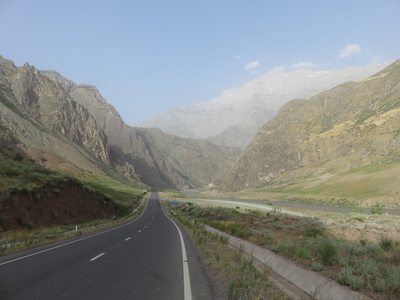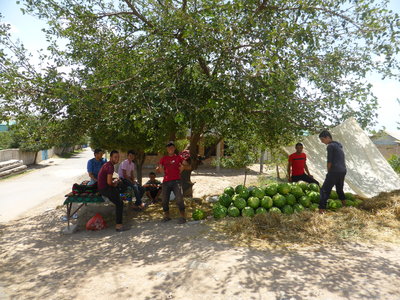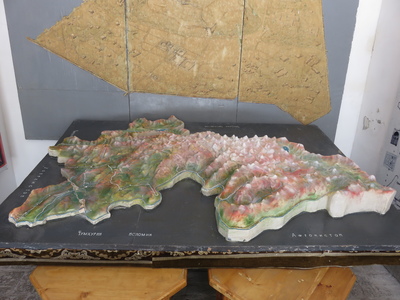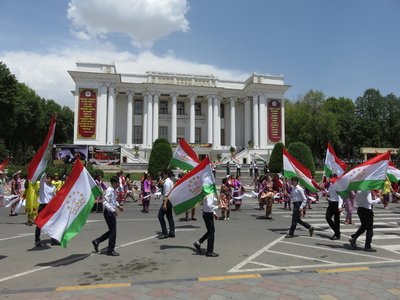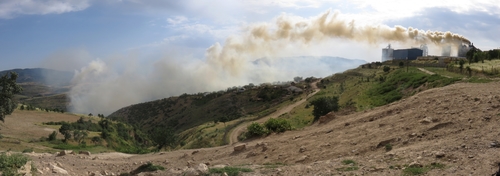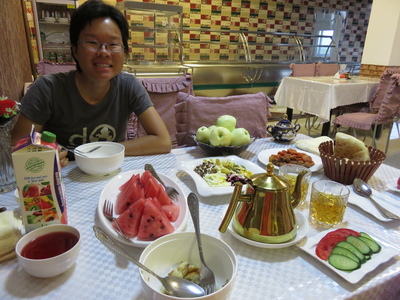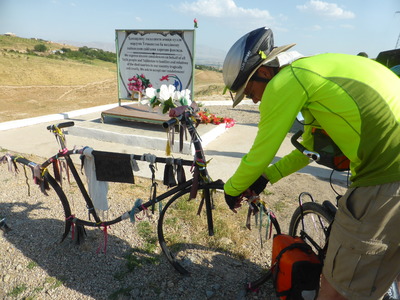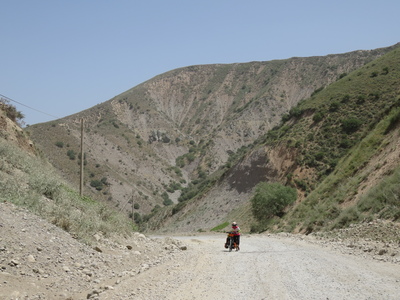Into the Pamirs
Posted on 2019-07-07
The rumors are true - immediately after the border from Uzbekistan, there were far fewer car horns. The border crossing was smooth, too. The German Ministry of Foreign Affairs advises against taking this crossing, since Tajik border officials might harass the few foreigners who cross there, but we didn't have any problems at all. No waiting time and they just waved us through customs check, for the first time since leaving Europe! So we arrived in Tursunzoda, the first town on the Tajik side, still in time to change some money. We originally wanted to camp somewhere, but then quickly decided to stay in the only hotel in town when we detected a few drops of rain. It was quite a fancy 3-star hotel (even though they have no running water at night), and surprisingly within budget. All this, plus meeting quite a number of people speaking English, resulted in us having a very relaxed start into the country.
Dushanbe doesn't offer that much to see, so we mostly focused on planning our route through the Pamirs and buying supplies that would be hard to find in the mountains. Specifically, we finally found gas canisters for our stove, as well as milk powder, oats, raisins and nuts for breakfast (so we won't have to eat bread all day). We bought so much of these items that our panniers were completely filled again, even though we managed to send a bag with some non-essential items ahead to Osh with some friendly overlanders with a car.
We spent our first afternoon in Dushanbe sorting out bureaucracy though. The Pamirs are part of the Gorno-Badakhshan Autonomous Region, and a permit is required to travel in the area. Instead of applying for this permit online together with our visa application for an extra 20USD, we decided to get it from the migration police office in Dushanbe directly for 2USD, an easy and straightforward affair. What was complicated, though, was buying a local SIM card, as the phone company employee insisted on us providing a police registration from the same police office. The friendly officers there told us that they could not issue this registration for our type of visa, and even helped us resolve the issue with the phone company employee, but this had us running back and forth between the two offices several times. Reportedly, Tajikistan's president/dictator had ordered all officers to be friendly to tourists and not to demand bribes. This does not extend to Afghan nationals though, as evidenced by the next applicant after us, who had to stuff his passport with money in order for it to be processed...
It was hot in Dushanbe, and our hostel room only had an ineffective evaporative cooler instead of the advertised air-con, so we had some horribly bad sleep during our stay there. We finally left Dushanbe quite sleep-deprived as we headed towards the Pamirs. There are two ways to get from Dushanbe to the first major village in the Pamirs, Qalai Khumb: the northern, more direct route across a 3000m pass on very bad roads, requiring cyclists to push frequently, or the southern route, longer but on mostly good roads across a number of smaller mountains. We took this second, easier option, but still suffered a lot from the heat, especially on the climbs. On the third day of cycling from Dushanbe, Hannah finally collapsed from the heat outside a hotel in Vose, 20km before Kulob, that was not marked on the map. As it turned out, the hotel had only been opened 10 days ago and we were their first foreign guests. The staff enthusiastically welcomed us as "distinguished guests", gave us a discount on the clean, air-conditioned room, and added full board for the incredible price of 2€ per person. When Hannah developed a fever the next day, it was clear that we were going to stay another night in this lucky find.
Crossing the Vakhsh river near Nurak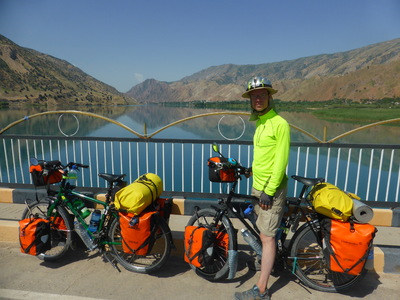
Nurak lake, an artificial reservoir created on the Vakhsh river by the Nurak dam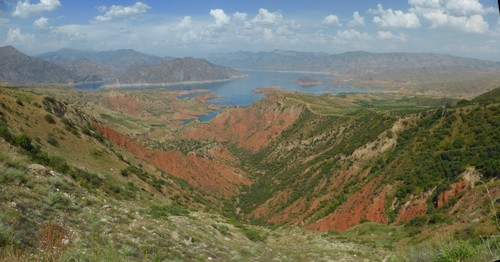
On our way, before the town of Danghara, we passed by the memorial for the group of bicycle tourists who were attacked and killed or injured at that very spot by Islamist terrorists about a year ago. This was in stark contrast to the people we encountered on the road, who were extremely welcoming.
The further we cycled from Dushanbe, the quieter the road traffic became, especially after we left Kulob, the last major town on this road, and started climbing the last mountain range separating us from the Pamirs. It was a long, steep, and hot climb up the mountains, with road conditions gradually becoming worse, and we were so relieved to reach a water source a few kilometers before the top that we camped right next to it. The next day, we continued up the bad gravelly road to the top, where we passed our first military checkpoint, and then several villages on a plateau, after which the road turned into perfect tarmac and we rolled all the way down into a deep, rocky valley cut by the Panj River. We had arrived in the Pamirs!
Climbing up the hazy mountains between Kulob and the Panj River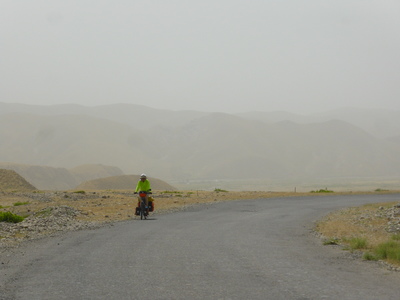
Finally reaching the Panj River, that forms the border between Tajikistan and Afghanistan